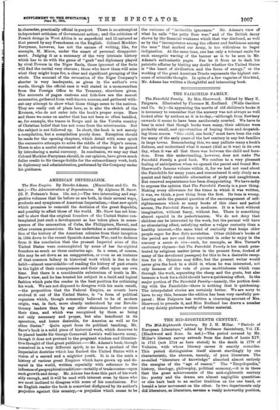AMERICAN IMPERIALISM.
The New Empire. By Brooks Adams. (Macmillan and Co. 6s. net.)—The Administration of Dependencies. By Alpheus H. Snow. (G. P. Putnam's Sons. 15s. net.)—The two interesting and sug- gestive volumes that lie before us are both, in their several ways, products and symptoms of American Imperialism,—that new spirit which promises to remould the destinies of the great Republic, and possibly to affect those of the world. Mr. Snow has set him- self to show that the original founders of the United States con- templated just such a development as has taken place in conse- quence of the annexation of Cuba, the Philippines, Hawaii, and other oversee possessions. He has undertaken a careful examina- tion of the history of the American colonies from their inception in 1584 down to the recent Spanish-American War, and he deduces from it the conclusion that the present Imperial aims of the United States were contemplated by some of her far-sighted founders as much as three centuries ago. In a sense, of course, this may be set down as an exaggeration, or even as an instance of that common fallacy in historical work which is due to the habit—almost unavoidable—of reading the history of past events in the light of their consequences and their effect upon our own time. But there is a considerable substratum of truth in Mr. Snow's view, and he has treated his subject in a lucid and logical fashion which puts the reader in the best position for criticising his work. We are not disposed to disagree with his main result, —the proposition that the Federal Empire, as events have evolved it out of the United States, is "a form of political organism which, though commonly believed to be of modern origin, was, in fact, more clearly understood by our Revolu- tionary leaders than by any other statesmen before or since their time, and which was recognised by them as being not only necessary and proper, but also beneficent in its operation, and hence desirable, for America as well as for other States." Quite apart from its political teaching, Mr. Snow's book is a solid piece of historical work, which deserves to be placed beside Sir George Cornwall Lewis's well-known essay, though it does not pretend to the pregnant wisdom and illumina- tive thought of that great publicist.—Mr. Adams's book, though conceived in a very different spirit, is no less a product of the Imperialist doctrine which has flushed the United States with a vision of a second and a mightier youth. It is in the main a history of various great Empires which have grown up and de- cayed in the world, written especially with reference to the influence of geographical conditions—notably of trade routes—upon such growth and decay. Mr. Adams has done this part of his work ably enough, and it will be read with interest even by those who are most inclined to disagree with some of his conclusions. For an English reader the book is somewhat disfigured by its author's prejudice against this country,—a prejudice which seems to be
the outcome of "invincible ignorance." Mr. Adams's view of what he calls "the petty Boer war," and of the British decay shown by the financial weakness which that war disclosed, as well as by the "incompetence among the officers and feebleness among the men" that marked our Army, is too ridiculous to beget indignation. At the same time, one has only a tolerant smile for such energetic waving of the banner as is to be seen in Mr. Adams's enthusiastic pages. Far be it from us to dash his patriotic afflatus by hinting any doubt whether the United States is " the heart of civilisation and the focus of energy," or the working of the great American Trusts represents the highest out- come of scientific thought. In spite of a few vagaries of this kind, Mr. Adams has written a thoughtful and interesting book.






















































 Previous page
Previous page